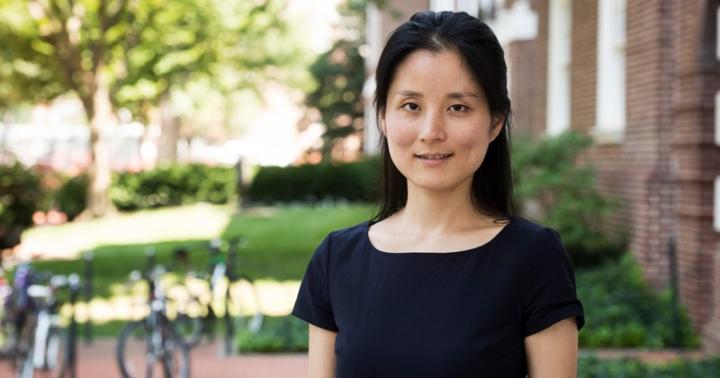Engineering professor selected for Army Research Office Young Investigator Program

Credit: Photo by Kathy F. Atkinson
Tingyi Gu, an assistant professor of electrical and computer engineering at the University of Delaware, has been selected for the Army Research Office Young Investigator Program.
This prestigious award goes to early-career researchers pursuing fundamental research in areas relevant to the Army. Gu is studying materials that exploit the interface between light and electronics for potential use in lasers, displays, memory and more.
The award began May 1, 2020.
“The materials in this research show promising potential for a new class of photonic devices that can be altered from one state to another (crystalline to amorphous) by heating elements at very high speeds,” said Michael Gerhold, program manager, Army Research Office, an element of the U.S. Army Combat Capabilities Development Command’s Army Research Laboratory. “The Army could use these devices in laser beam steering, neuromorphic photonic computing, and other data processing circuits for next generation network capabilities.”
In her research program, Gu develops circuits and devices that consume very low power, but these systems are limited by the properties of the materials they are made of. To develop even more desirable systems, scientists must uncover new insights about these materials.
“We want to solve these bottleneck problems on the material level,” said Gu, “the proposed effort can be important building blocks along with joint efforts by our current collaborator at Army Research Lab.”
In this fundamental research project, Gu will study phase transfer materials, which absorb or release heat as they transition from solid to liquid and back, at the atomic level. The optical properties of these materials make them useful for a variety of applications — in fact, old-school compact discs (CDs) contain phase transfer material that can be read or “burned” with a laser. These materials can also be used to record information in computers and a variety of other electronic devices.
“This project gets me interested in phase change materials and application in nonvolatile memory devices beyond my past experience on silicon photonics”, said Tiantian Li, a postdoctoral scholar in Gu’s group, who worked on the device design, fabrication, and testing.
“The interesting thing about phase change materials is how we can tune them by manipulating their innate properties for applications from data storage to energy. A deeper understanding of their structural, optical and electrical properties is pivotal to explore all the potential applications of these materials”, said Anishkumar Soman, a graduate student in the Department of Electrical and Computer Engineering.
Using methods such as spectroscopy, Gu aims to uncover how new phase transfer materials work and interact with light so that she can figure out ways to overcome their limitations.
Two graduate students will help Gu with the project.
Gu is a highly decorated early-career researcher. In 2017, she received an Early Career Faculty (ECF) Award from NASA and was selected for the Air Force Office of Scientific Research (AFOSR) Young Investigator Program.
Gu joined the UD faculty in fall 2016 after completing a post-doc in Prof. Craig Arnold’s group at Princeton University’s Princeton Institute for the Science and Technology of Materials and a post-doc in Dr. Raymond Beausoleil’s group HP labs, Palo Alto, where she developed interest and experience on chalcogenide phase change materials and large-scale nonlinear photonic logic circuits, respectively. Now she combines her experience and interest for developing new research directions.
###
Media Contact
Peter Kerwin
[email protected]
Original Source
https:/




